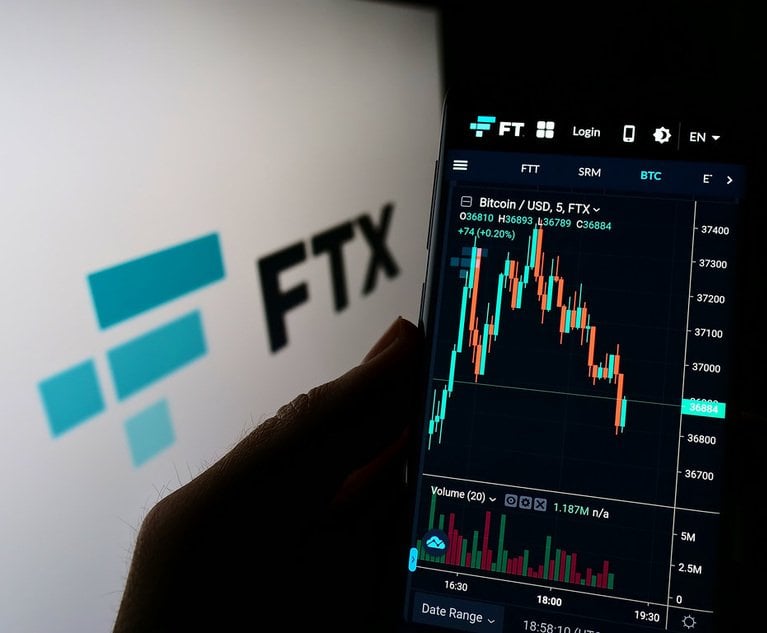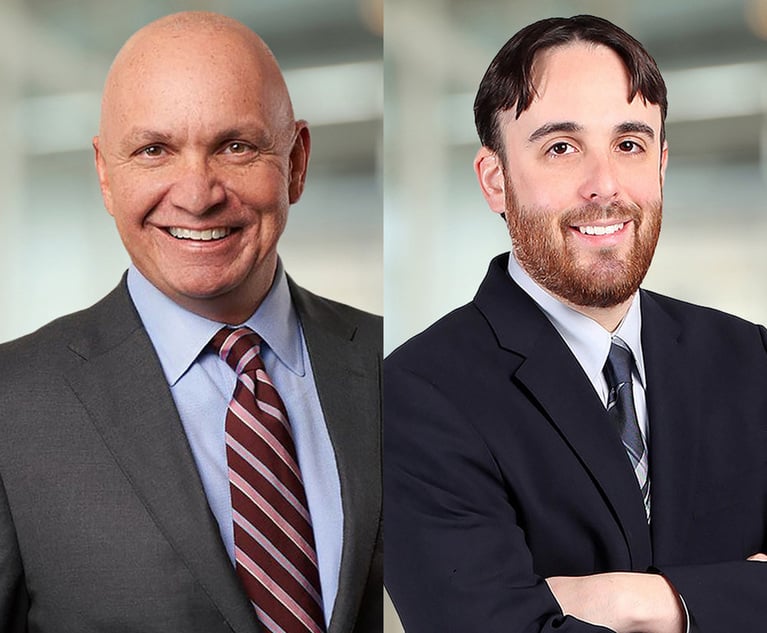 FTX Trading. Credit: Timon/Adobe Stock
FTX Trading. Credit: Timon/Adobe Stock FTX Estate Seeks to Recoup $1.76B From Binance, Plus Exec 'Piggy Bank' Payouts
FTX and its affiliates, represented in the bankruptcy court by Sullivan & Cromwell and Landis, Rath & Cobb, have filed a total of 36 adversary actions since Oct. 28, 25 of which were filed on Nov. 8.
November 11, 2024 at 04:07 PM
3 minute read
Attorneys for FTX have filed dozens of actions in the Delaware Bankruptcy Court seeking to recover funds for the cryptocurrency exchange's bankruptcy estate, including $1.76 billion Binance received for selling its FTX stake.
Filings call the Binance clawback and others fraudulent transfers, stating FTX would have been insolvent when making payments leading up to its November 2022 Chapter 11 petition.
FTX and its affiliates, represented in the bankruptcy court by Sullivan & Cromwell and Landis, Rath & Cobb, have filed a total of 36 adversary actions since Oct. 28, 25 of which were filed on Nov. 8. Debtors' counsel has been filing adversary actions seeking to recover funds for the FTX estate for nearly two years, but previous actions have been filed more sporadically.
The Binance sale has the largest price tag among the recently-filed actions, but FTX is also attempting to recover hundreds of millions of dollars invested in cryptocurrency and distributed across multiple exchanges, as well as funds it claims were taken from FTX by criminal means.
The complaints seek to recover nearly $44 million allegedly routed through FTX to nonprofits and political action groups at a time the exchange was insolvent but before a bankruptcy petition was filed. One brings breach of fiduciary duty claims against former FTX executive Ryan Salame, who pleaded guilty to campaign finance fraud charges and is currently serving a 90-month sentence in federal prison. FTX has asked the court to void transfers made to Salame, who is alleged to have received $98.8 million in misappropriated funds from the FTX estate.
Criminal charges involving political contributions were also brought against FTX co-founder Sam Bankman-Fried, but were dropped last July as part of an extradition treaty between the United States and the Bahamas. Filings from Nov. 8 state Bankman-Fried, former FTX executives Gary Wang and Nishad Singh and former Alameda Research CEO Caroline Ellison, using FTX as "their personal piggy bank and treasury," siphoned billions of dollars of customer funds away from FTX "to finance their lavish lifestyles, woo business prospects and political allies, line their pockets and those of their families and friends, and make reckless investments designed to prop up and advance their stature and notoriety in the crypto community."
Several of the complaints state the amount FTX executives invested in certain ventures far outweighed the returns on those investments. Among those payouts is $25 million, plus millions more in later payments and bonuses, transferred to a group that included Bankman-Fried's childhood friends and his parents' godson for the development of a video game that never progressed beyond beta testing.
"As with so many of the FTX insiders’ pre-petition 'friends and family' investments and payments, there was never even a pretense that the debtor was receiving reasonably equivalent value for its $25 million," that complaint stated.
FTX is similarly seeking to recover a $11.5 million investment in a bank holding company, which one filing called "an amount equal to double the bank’s entire reported net worth for just a 10% interest."
NOT FOR REPRINT
© 2025 ALM Global, LLC, All Rights Reserved. Request academic re-use from www.copyright.com. All other uses, submit a request to [email protected]. For more information visit Asset & Logo Licensing.
You Might Like
View All
'FTX' One Year Later: The Impact on Examiner Practice in Bankruptcy Courts
9 minute read

Topping Kirkland, Weil Won the Most Valuable Major Bankruptcy Retentions of 2024

How New Jersey’s Pragmatic Bankruptcy Approach Sets It Apart Post-'Purdue Pharma'
7 minute readTrending Stories
- 1Judge Pauses Deadline for Federal Workers to Accept Trump Resignation Offer
- 2DeepSeek Isn’t Yet Impacting Legal Tech Development. But That Could Soon Change.
- 3'Landmark' New York Commission Set to Study Overburdened, Under-Resourced Family Courts
- 4Wave of Commercial Real Estate Refinance Could Drown Property Owners
- 5Redeveloping Real Estate After Natural Disasters: Challenges, Strategies and Opportunities
Who Got The Work
J. Brugh Lower of Gibbons has entered an appearance for industrial equipment supplier Devco Corporation in a pending trademark infringement lawsuit. The suit, accusing the defendant of selling knock-off Graco products, was filed Dec. 18 in New Jersey District Court by Rivkin Radler on behalf of Graco Inc. and Graco Minnesota. The case, assigned to U.S. District Judge Zahid N. Quraishi, is 3:24-cv-11294, Graco Inc. et al v. Devco Corporation.
Who Got The Work
Rebecca Maller-Stein and Kent A. Yalowitz of Arnold & Porter Kaye Scholer have entered their appearances for Hanaco Venture Capital and its executives, Lior Prosor and David Frankel, in a pending securities lawsuit. The action, filed on Dec. 24 in New York Southern District Court by Zell, Aron & Co. on behalf of Goldeneye Advisors, accuses the defendants of negligently and fraudulently managing the plaintiff's $1 million investment. The case, assigned to U.S. District Judge Vernon S. Broderick, is 1:24-cv-09918, Goldeneye Advisors, LLC v. Hanaco Venture Capital, Ltd. et al.
Who Got The Work
Attorneys from A&O Shearman has stepped in as defense counsel for Toronto-Dominion Bank and other defendants in a pending securities class action. The suit, filed Dec. 11 in New York Southern District Court by Bleichmar Fonti & Auld, accuses the defendants of concealing the bank's 'pervasive' deficiencies in regards to its compliance with the Bank Secrecy Act and the quality of its anti-money laundering controls. The case, assigned to U.S. District Judge Arun Subramanian, is 1:24-cv-09445, Gonzalez v. The Toronto-Dominion Bank et al.
Who Got The Work
Crown Castle International, a Pennsylvania company providing shared communications infrastructure, has turned to Luke D. Wolf of Gordon Rees Scully Mansukhani to fend off a pending breach-of-contract lawsuit. The court action, filed Nov. 25 in Michigan Eastern District Court by Hooper Hathaway PC on behalf of The Town Residences LLC, accuses Crown Castle of failing to transfer approximately $30,000 in utility payments from T-Mobile in breach of a roof-top lease and assignment agreement. The case, assigned to U.S. District Judge Susan K. Declercq, is 2:24-cv-13131, The Town Residences LLC v. T-Mobile US, Inc. et al.
Who Got The Work
Wilfred P. Coronato and Daniel M. Schwartz of McCarter & English have stepped in as defense counsel to Electrolux Home Products Inc. in a pending product liability lawsuit. The court action, filed Nov. 26 in New York Eastern District Court by Poulos Lopiccolo PC and Nagel Rice LLP on behalf of David Stern, alleges that the defendant's refrigerators’ drawers and shelving repeatedly break and fall apart within months after purchase. The case, assigned to U.S. District Judge Joan M. Azrack, is 2:24-cv-08204, Stern v. Electrolux Home Products, Inc.
Featured Firms
Law Offices of Gary Martin Hays & Associates, P.C.
(470) 294-1674
Law Offices of Mark E. Salomone
(857) 444-6468
Smith & Hassler
(713) 739-1250






